
Descripción general
Photovoltaic systems have many components, one of which is solar panels.
The photovoltaic system collects solar energy and converts it into usable electrical energy. These photovoltaic panels can be used to meet energy needs or provide electricity to remote areas.
Solar energy is widely used in various electricity projects such as enterprises and public utilities, así como aplicaciones residenciales y comerciales.
Al mismo tiempo, La mayoría de los paneles solares que verás son azules, mientras que la otra parte es principalmente negra. Este cambio de color es causado por la interacción entre la luz y dos tipos diferentes de paneles solares: paneles fotovoltaicos de silicio monocristalino y paneles fotovoltaicos policristalinos.
Después de todo, Los paneles solares azules siempre han sido el tipo más común de panel solar.
Sin embargo, Es posible que haya notado que algunos paneles solares tienen una apariencia negra más elegante.; Se están volviendo cada vez más frecuentes en las instalaciones de mercado actual..
Aunque los paneles solares son actualmente negros o de color azul extremadamente oscuro, Puede encontrar que los paneles solares de colores se están volviendo cada vez más populares.
Si también desea considerar otros paneles solares de color durante la instalación, Creo que el contenido de este artículo sobre paneles solares fotovoltaicos le resultará útil..
Why are Most Solar Panels Black or Blue?
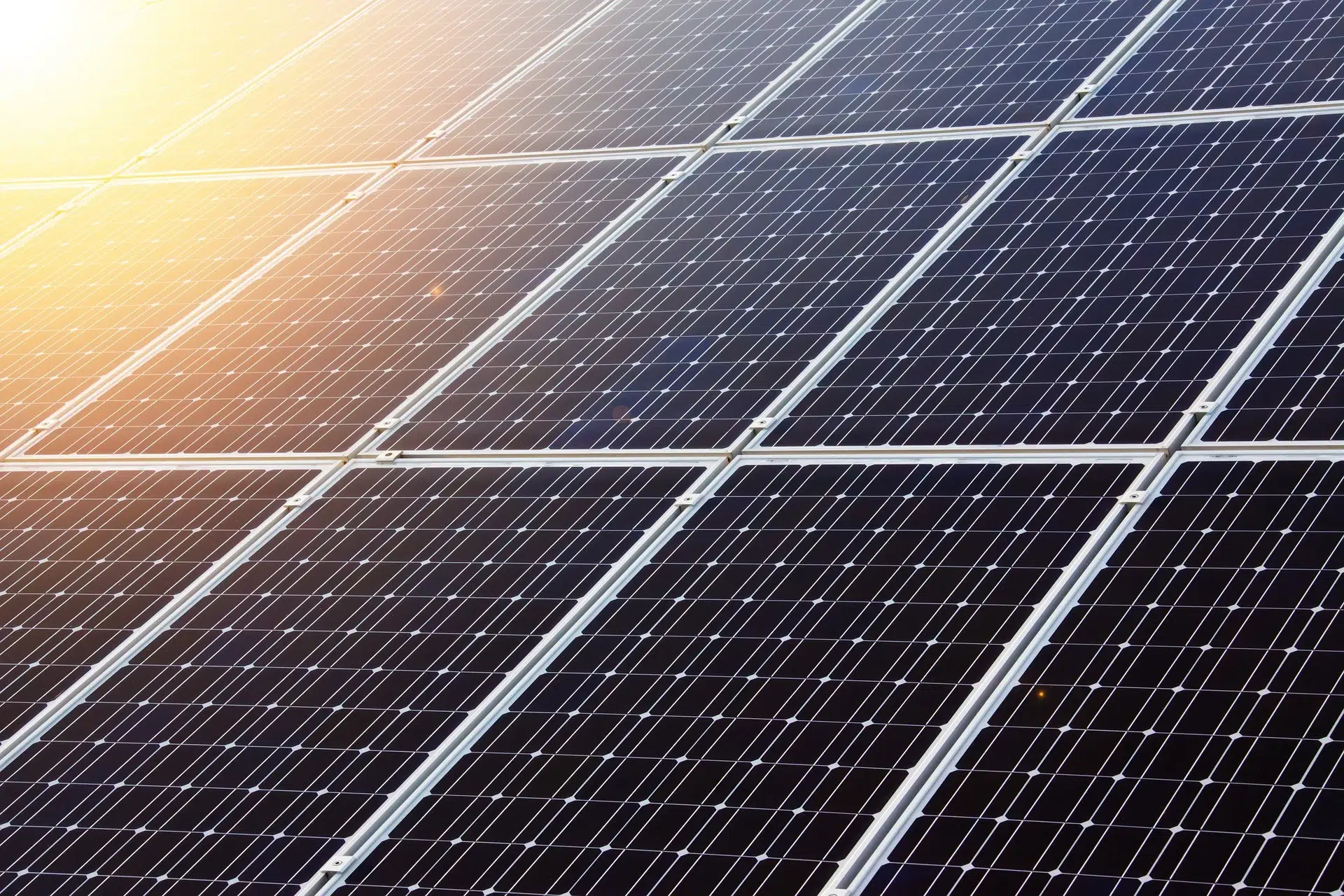
En primer lugar, echemos un vistazo al material de los paneles solares., ya que es posible que el color de los paneles solares no esté determinado por las preferencias estéticas del fabricante.
Los dos colores principales de los paneles solares son el negro y el azul., correspondiente al silicio monocristalino y al silicio policristalino, respectivamente.
Hay dos tipos principales de paneles solares disponibles comercialmente.: paneles solares de silicio monocristalino y paneles solares de silicio policristalino.
Este es el color natural que adquiere el silicio durante el proceso de fabricación.
Además, Los fabricantes de marcas y la mayoría de los clientes están más preocupados por la eficiencia.. Los paneles solares negros o azules son los más eficientes, ampliamente utilizado, y rentable debido a factores del proceso de fabricación. Por lo tanto, La producción tiende naturalmente a inclinarse hacia estos colores..
Black Monocrystalline Silicon Solar Panels
Los paneles solares monocristalinos son negros y están hechos de un único cristal de silicio de alta calidad.. En comparación con los cristales de silicio utilizados en los paneles solares policristalinos azules, este tipo de silicio tiene mayor pureza.
Cada célula solar está hecha de material de silicio monocristalino., Especialmente el negro que absorbe más luz que el azul., lo que mejora enormemente su eficiencia.
A medida que el costo de toda la industria disminuye, La mayoría de las instalaciones de paneles solares más nuevas utilizan estos paneles de silicio monocristalino negro porque la gente quiere que proporcionen una mayor eficiencia..
Entonces la eficiencia es el primer factor que los usuarios consideran.
Aunque los métodos de producción de paneles negros y azules son básicamente los mismos, Todo el proceso de producción de baterías negras monocristalinas es más complejo que el proceso de producción de células solares azules policristalinas..
El efecto de interacción entre baterías monocristalinas y baterías compuestas por una gran cantidad de cristales también es diferente..
Para obtener la forma correcta de la batería, Se cortarán los cuatro lados del chip de silicio., lo que significa que se perderá una gran cantidad de silicio puro en el proceso de fabricación de células solares de silicio monocristalino negro..
Blue Polycrystalline Silicon Solar Panels
Los paneles solares policristalinos a menudo se denominan “paneles solares azules” debido a su color azul.. A diferencia de las baterías de silicio monocristalino, Las baterías de silicio policristalino están compuestas de múltiples cristales de silicio originales..
Sus métodos de fabricación son muy similares., sin embargo, Para la producción de células solares de silicio policristalino, El proceso de extracción de las semillas de silicio (Un material requerido para fabricar células solares negras de un solo cristal) se pasa por alto.
Después de derretir el cristal de silicio y verterlo en la ranura, Simplemente enfríe para hacer una batería de silicio policristalina.
Esto da como resultado que las células solares azules tengan sus propias partículas y límites únicos., junto con la forma en que las células policristalinas reflejan la luz, finalmente dando a estos paneles solares un efecto reflectante azul.
La tecnología de silicio policristalina era más barata que la tecnología de silicio monocristalina en el pasado, Es por eso que puede ver más paneles solares azules en algunos sitios de instalación más antiguos.
What Is the Most Popular Color of Solar Panels Besides Black and Blue?
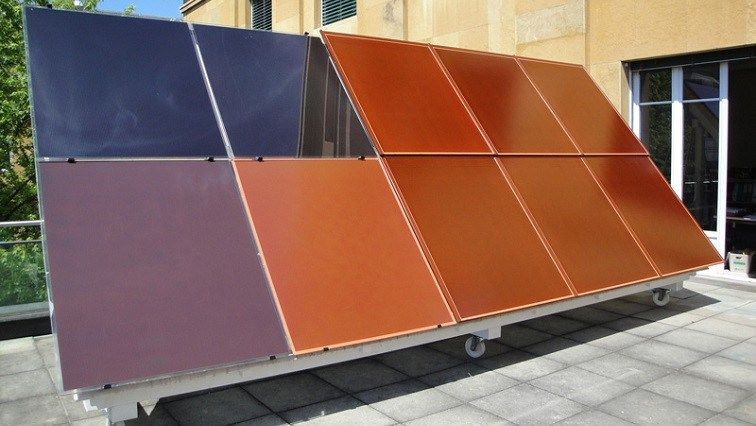
Además del clásico negro o azul, Los paneles solares blancos y verdes son colores más comunes.
Los paneles solares blancos son una opción popular para muchas empresas en el mercado de aplicaciones comerciales porque su apariencia no es llamativa y combina mejor con la combinación de colores externos de los edificios en las ciudades..
Los paneles solares ecológicos son adecuados para usuarios que viven en zonas con abundante vegetación, vegetación densa, e incluso bosques. Indudablemente, Esto también es para adaptarse al color ambiental..
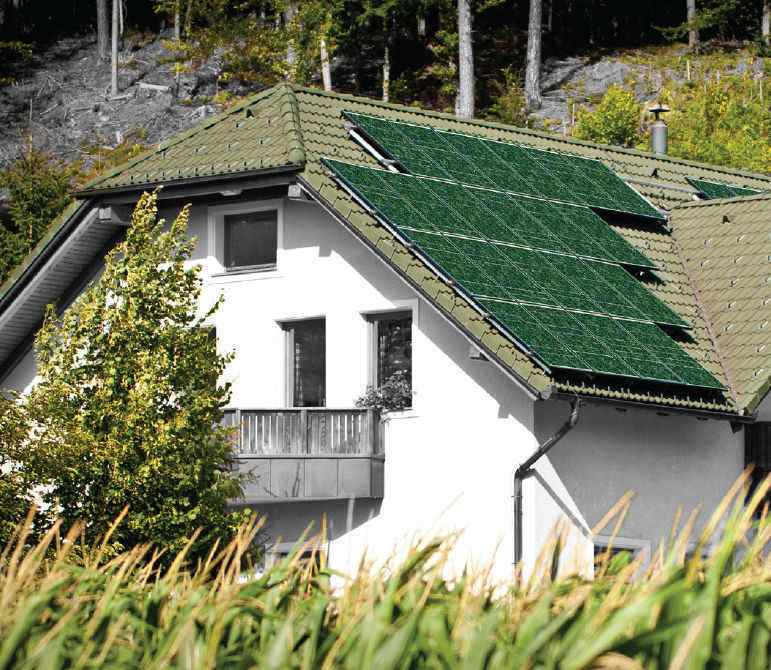
Do Solar Panels Come In Different Colors?
Al leer esto, creo que ya tienes la respuesta: Sí, Los paneles solares vienen en varios colores para elegir..
Pero no puedes simplemente pedir paneles solares en tus colores preferidos para decorar tu casa según tus preferencias personales..
Generalmente hablando, Los paneles de colores son más caros y generan menos electricidad..
porque actualmente, si los fabricantes de paneles solares quieren producir colores de paneles solares distintos del azul y el negro, deben usar tintes o recubrimientos.
Como se mencionó anteriormente, La eficiencia está ligada a la interacción entre la luz y estos paneles., por lo que otros colores reducirán la eficiencia de los paneles. Reducir la energía generada por los paneles solares ralentizará indirectamente el período de presentación de resultados, entonces este método de colorear paneles solares no es una buena idea.
Además, Los recubrimientos y tintes se desvanecerán durante el 15 a 20 años de vida útil de los paneles solares, resultando en una pérdida de estética.
Los datos muestran que la eficiencia de algunos paneles solares de colores (dependiendo de su color) es 30-45% más bajo que el de los paneles solares de silicio policristalino azul estándar o los paneles solares de silicio monocristalino negro.
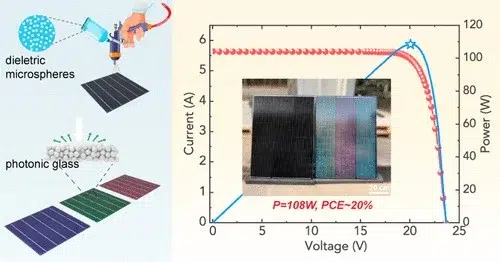
Esto puede ralentizar la velocidad a la que los sistemas solares fotovoltaicos esperan recibir retornos de inversión., especially since the cost of these panels is higher, resulting in higher upfront investment.
Sin embargo, researchers are also trying many new technologies to create more efficient color panels and a wider range of colors, so that solar panels can adapt to more environments, color schemes, and environmental aesthetics.
So even though we don’t have all the rainbow colored solar panels yet, this technology is being researched and developed, and we can look forward to the future together.
Sin embargo, solar energy installers may not be willing to purchase these colored solar panels at present, as for them, the vast majority of customers choose solar energy to reduce energy costs and lower their billing figures.
Por lo tanto, customers may not necessarily want solar panels with fancy colors because they have higher costs and lower conversion efficiency. So for installers, the cost of providing color solar panels for individual customer needs is too high.
Can I Buy Color Solar Panels?
Although colored solar panels may not be the most commercially viable product for installers and manufacturers, you can still choose to install colored solar panels on the roof.
Sin embargo, due to the lower efficiency and higher cost of current technology compared to black and blue solar panels, you may need to collaborate with specialized manufacturers or installers to order and install them.
Before making a purchase, you need to understand
- Dyes and coatings cannot cope well with harsh weather conditions, so colored panels may eventually lose their ability to function within 25 años de uso. Por lo tanto, for ordinary homeowners, this aesthetic improvement is not worth sacrificing the efficiency of the panels and increasing their investment costs.
- Due to the different ways silicon is formed during the manufacturing process, you also need to find a full line communicator willing to start working with you during the design phase to design a photovoltaic system solution that uses these less efficient color photovoltaic panels but still produces the maximum power within its range.
This is a long-term partnership that requires customization according to your preferences.
Choosing GYCX, our company that provides one-stop services, is your ideal choice.
Color Generated by Scattered Light in Solar Panels
Researchers have studied the integration reaction between silicon solar cells and dielectric nano scatterers composed of crystalline silicon nano cylinders on their surfaces, resulting in the development of bright green solar cells with an efficiency loss of only 9-11%.
Surface Structure
A research team from the University of Hong Kong in China utilized a microscopic shape that only reflects narrow and selective light, resulting in color.
The research team sprayed a layer of disordered dielectric micro zinc sulfide spheres onto the surface of the solar cell.
Most light passes through photonic glass, sin embargo, selective color is reflected based on the size of the sphere. Researchers created blue, green, and purple solar panels, but their efficiency only decreased by about 1-2%.
Through standard durability testing, solar panels made of a layer of photonic glass have also maintained their color and performance.
The team is researching how to make colors more vibrant and saturated, and generate a wider range of colors.
Solar Windows
There is a huge demand for air conditioning and cooling in residential and commercial buildings in the United States, and a feasible solution is to generate solar energy by sandwiched perovskite crystal films between glass layers and utilizing sunlight to generate photovoltaic electricity.
Perovskite is a crystalline mineral that can utilize sunlight and convert it into electricity, making it a hot research topic due to its potential to replace silicon as a high-quality material for solar systems at lower costs and higher efficiency.
NREL scientists place a layer of perovskite film between two layers of glass and inject water vapor to change the internal humidity.
This will generate a chemical reaction, causing the perovskite to arrange into different shapes. Por ejemplo, from chain structures to flakes, and even cubes.
The change in shape can lead to different colors, and after reducing humidity, the perovskite will return to its normal transparent state.
Entonces, for the traditional concept of windows, an application question has emerged:
Does transparent solar panels exist?
Transparent solar panels, also known as photovoltaic glass, are less popular than white solar panels because they have higher construction and installation costs.
And compared to black solar panels, its efficiency is only 5%, which is extremely low in cost-effectiveness. Sin embargo, for devices like windows, it is a relatively ideal material.
So although photovoltaic glass can be used for solar panels, people are currently more interested in using it in solar windows.
So from a technical perspective, during manufacturing, the arrangement and dispersion behavior of silicon nanotubes on the panel surface can be adjusted to change the way light is scattered, resulting in different colors.
From an aesthetic perspective, due to the ability to create three primary colors of red, green, and blue, it can be said that almost any other color can be created on the panel.
Energy and Aesthetics
Why do you want a colorful solar panel?
Roof solar panels now have multiple color options to meet different user needs, although this may be niche.
Como se mencionó anteriormente, the appearance difference between blue and black solar panels is related to the manufacturing process, and after meeting the efficiency needs of users, people naturally start to pursue more things, such as their design and aesthetics.
If you enjoy adventure, warm colors may be your preferred color, and gold or orange can attract you.
If you love to see the sea and enjoy a peaceful atmosphere, cool colors such as lake blue and grape gray may be your favorite.
If you expect a different environmental atmosphere in one environment, such as in the orange yellow color scheme around the desert, you can also choose a blue-green design to achieve some unique and contradictory environmental beauty.
Here are several color combinations based on Chinese aesthetic art color scheme design, which may arouse your interest in colored solar panels.
Dunhuang Color Scheme

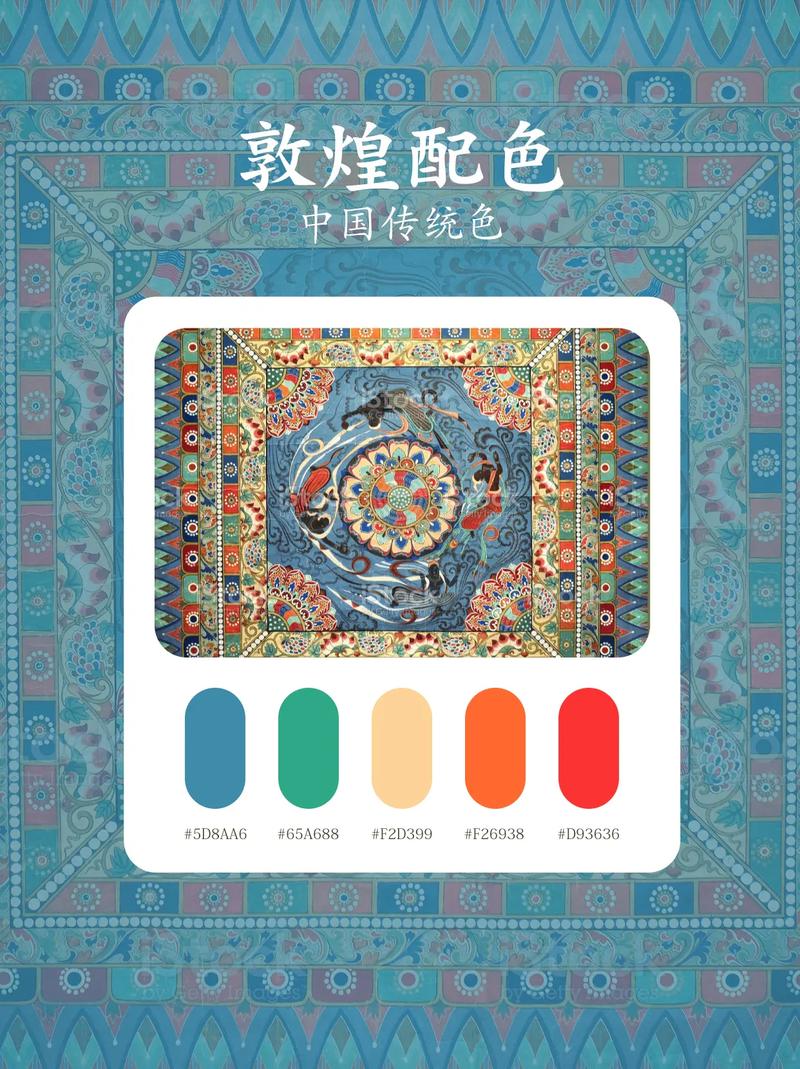
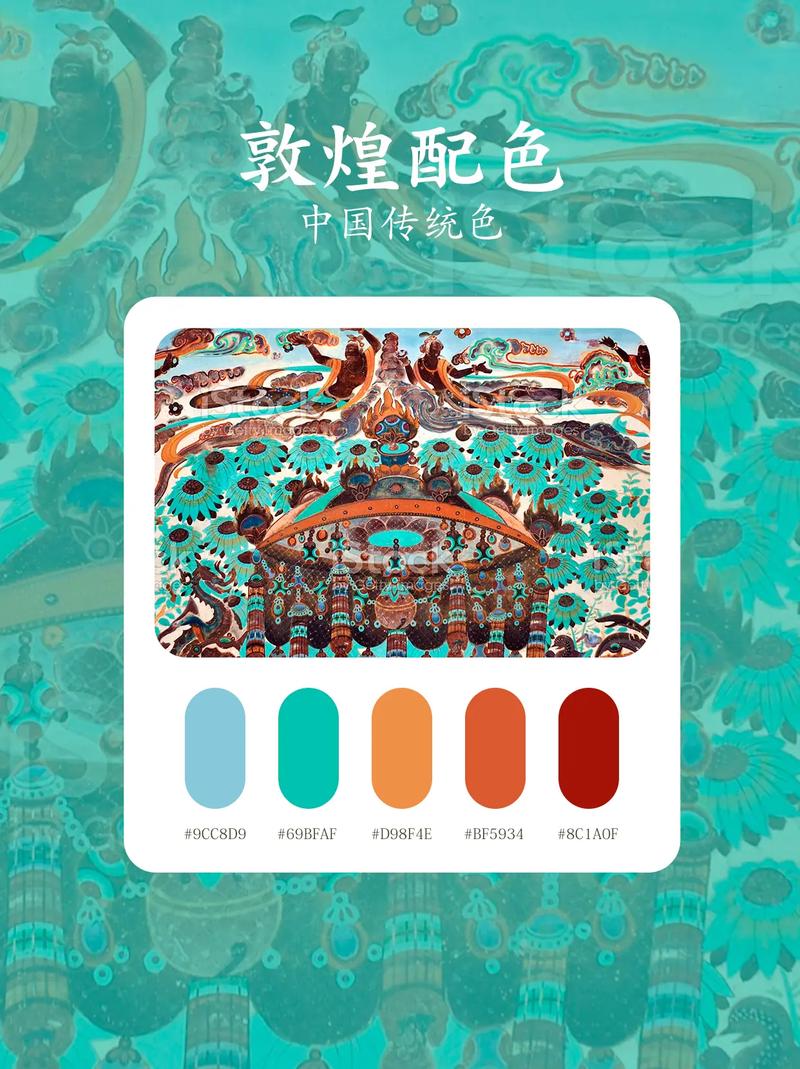

The use of solar panels, solar roof tiles, and even photovoltaic windows is beneficial for the construction of residential and commercial buildings, providing more color aesthetics when harvesting more energy benefits.
As development progresses, replacing the single color scheme of black solar panels will provide architects and decorators with more inspiration. Homeowners and end-users are more receptive and have more types of choices, which will lead to more people choosing solar systems.
It is highly worthwhile to conduct research on solar energy colorization in the industry.
Conclusión
The technology related to solar panels has been advancing, and some companies are committed to developing more efficient color panels.
With the development of demand, more aesthetically pleasing choices have become a reality. Some people who pursue beauty may consider color when choosing to install solar panels, believing that sacrificing a little efficiency can provide more visual enjoyment.
If you want the color of solar photovoltaic panels to match the environmental beautification of your house or city, you should pay attention to the latest related photovoltaic panels, which can increase the range of available colors of photovoltaic panels and reduce their efficiency loss.
If you don’t want to wait and are ready to install a solar system at home immediately, por favor contact GYCX immediately.
We are willing to cooperate with you from the design phase to installation, Brindar mantenimiento a largo plazo para garantizar que usted obtenga el sistema de generación de energía solar adecuado para usted para proporcionar la máxima energía requerida y reducir los costos más innecesarios..
